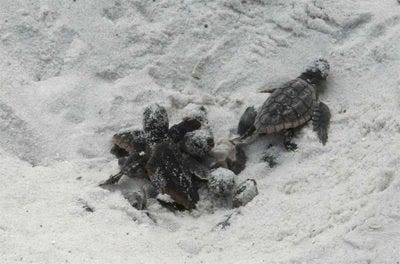![Sea turtle hatchlings make their way to the gulf. [Special to the Press Gazette]](http://127.0.0.1/wordpress/wp-content/uploads/2022/01/ghows-DA-4d499a79-e92a-2d0c-e053-0100007f2a3f-44f5f25e.jpeg)
MILTON — Santa Rosa County encourages visitors and residents of Navarre Beach to practice light pollution reduction and keep the beaches clean and safe for sea turtles.
Sea turtle nesting season in Florida runs from May through October, with thousands of endangered turtles laying eggs on the southeastern United States’ coastal shores.
All six species of sea turtles found in U.S. waters are listed as threatened or endangered and protected by the Endangered Species Act. Navarre Beach is home to four of these: loggerhead, green, leatherback and Kemp's ridley.
An estimated one in 1,000 sea turtle hatchlings survive to reach adulthood. Light pollution has a negative effect on sea turtles, causing hatchlings to become disoriented and head away from the Gulf of Mexico when they emerge from their nest.
Additionally, items such as beach chairs, small boats, tents and recreational equipment left on the beach have caused sea turtles to become disoriented on the beach. Sea turtles cannot back up, so an obstacle on the beach can cause the turtle to waste energy wandering around on the beach, many times returning to the gulf without nesting.
To protect sea turtles’ nesting habitat, potential obstructions must be removed from the beach each evening. Santa Rosa County officials will remove items left on the beach overnight and those items will become public property, according to county ordinance.
Here are a few guidelines to keep turtles safe:
- Do not disturb nesting females or hatchlings by using flashlights, flash photography or lanterns.
- Turn out beachfront lights after dusk.
- Close blinds and curtains in beachfront homes and condos when interior lights are on at night.
- Reposition fixtures so that the point source of the light bulb is no longer visible from the beach. Use sea turtle friendly bulbs and fixtures.
- Shield the top and sides of exterior fixtures so that the light is directed downward onto your property and away from the beach.
- Plant or improve native vegetation buffers between the light and the open beach.
- Fill in any holes in the sand and knock down sand sculptures at day's end.
- Remember, pets are not allowed on beaches.
- Properly dispose of trash and discarded fishing gear. Sea turtles can become entangled in old fishing nets and lines or ingest plastic bags and wrappers, mistaking them for jellyfish. When fishing, avoid casting your line near a sea turtle.
Contact the Florida Fish and Wildlife Conservation Commission at 1-888-404-3922 to report an injured or dead sea turtle
HOW TO HELP
This article originally appeared on Santa Rosa Press Gazette: Lights off for sea turtles
